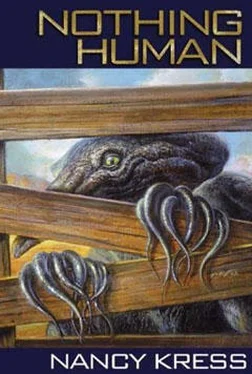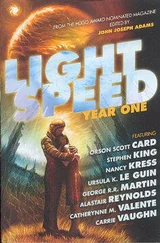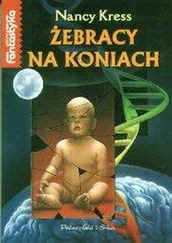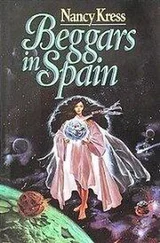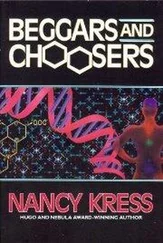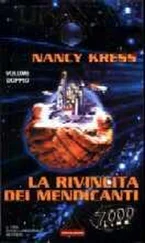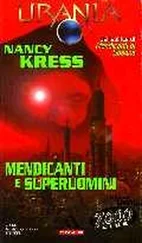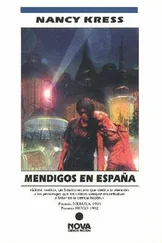By year’s end, all eleven of the girls engineered aboard the pribir ship, plus Clari, were pregnant. On January 7, war was declared with China. Within the first hour, missiles delivered bioweapons into the atmosphere over forty-seven targets in the United States.
The U.S. defense system, more obsolete than the government had even realized, shot down only eight. The Defense Department retaliated with bioweapons of their own.
Net news reported deaths in the millions, then the tens of millions. The camvids on the Net, the posted recordings of the dying, the roboviews of entire cities, were horrifying.
Then the Net sites, one by one, ceased to record, or post, or move from the frozen agony of whatever they’d been displaying last.
“It’s a mixed lot, from the little definitive information I can get on the medical list serves still running,” Uncle Scott said. “It’s possible not all the bioweapons are Chinese. There’s anthrax and Ebola, for sure, possibly modified. The Ebola may have been made airborne. There are also engineered bacteria and viruses and even spores, which present a special problem because they remain viable so long. One in particular we want to watch out for—it induces your cells to produce TP53 in enormous quantities, and that in turn induces apoptosis.”
“What’s that?” Sajelle said.
“It makes your cells commit suicide.”
Emily, very pale, added, “We want more samples from each of you.”
Cord had already given so many samples of blood and tissue that he felt like he’d run into a cactus. Poke here, pierce there, scrape somewhere else. Not that there was much choice.
Kendra said, “What about the babies? How can you tell if they’re going to be all right?”
“We’re going to take amniotic samples from each of you,” Emily said.
Cord put his arm around Clari. Guilt, a constant cloud, settled into his bones. Unlike the other pregnant girls, Clari hadn’t sought the sex that led to this. And unlike the other pregnant girls, she wasn’t engineered for a super-boosted immune system. Julie and Sajelle, pribir-blessed women married to normal men, had passed on their lesser protection to their new babies. But would it work for Cord to pass on his unfathomable genes to Clari’s children? Was his total engineering, like the previous generation’s milder version, dominant? Nobody knew.
By summer, the only people transmitting live on the Net lived in isolated pockets in rural areas. Rafe monitored every waking hour. Grimly he reported that some of those people were falling ill, too, from a dozen different diseases.
“The winds go everywhere,” Clari said. She was having a very bad pregnancy, morning sickness and anemia and edema and half a dozen other things Cord couldn’t name. He wanted to spend every minute with her, and he wanted, from guilt, to never see her at all. Fortunately, the decision was not his. Every person on the farm was working as hard as possible all day, every day, to make the place self-sufficient. There were a lot of things they were going to have to do without, but right now the aim was simple survival.
Taneesha said, “You mean… everybody in the world might die?”
“Except us,” Emily said. She was too thin. She hadn’t eaten more than snatched mouthfuls in days. Neither had Dr. Wilkins, who was much older and looked much worse.
Clari said, “How would we know if anybody else survives?”
Lillie said, “Rafe will hang onto the Net until nobody at all posts or until the satellites fall out of the sky. But there might be really isolated groups that survive who don’t have Net access. Inuit or Laplanders or someone.”
Cord didn’t know who those people were, and he didn’t ask. It wouldn’t help anything. And the truth was, he didn’t really care.
Uncle Scott cared. He said somberly, “When I was born, the world held six billion people. After the first biowar there were two billion left, about the same as there had been in 1900. Today there’s maybe two hundred million people on Earth. I’m estimating, of course, extrapolating from what few figures I have. Two hundred million is the same number as when Christ was born. And the number is going down.”
Emily said gently, “Scott, the changed ecosystems probably can’t support many more than that, anyway.”
“And who changed them? Us. Humans. We’re all as guilty of these deaths as the people who fired those bioweapons.”
To Cord, that was just silly. He and Uncle Scott and Aunt Emily hadn’t killed anybody. Somebody in one of the back bedrooms began to play the music cube: “Don’t Matter None to Me.”
“Population projections for this year,” Uncle Scott said, “once were ten billion people. Instead, we have suigenocide.” He walked heavily to his room and closed the door.
Cord didn’t know what “suigenocide” was. He didn’t ask Aunt Emily. She and Uncle Scott were talking about the past, and the past was over and gone. Cord honestly couldn’t see the point. “We’ve lost so much,” Aunt Robin constantly whined. But Cord couldn’t see that, either.
Everything that mattered to him was here, now.
Then, in April, the cattle suddenly began to die.
“Oh, God,” Lillie said. “Scott, what can we do?”
“Nothing until we figure out what’s killing them,” Scott said testily. “Send the range crew out for blood and tissue samples. Mark each cow carefully so we know what came from whom. Emily and I will get to work as soon as you bring the samples back.”
“No,” Emily said.
It was another farm meeting in the great room. As usual, only about half were present; the rest couldn’t be spared from vital work, or were grabbing a few hours of sleep, or, in the case of Clari and Felicity, were throwing up from pregnancy. Another meeting, but different, Cord thought. He could remember when farm meetings had announced new income, new cattle purchases, new gains in water supplies. Now all the news was bad.
The room even looked different. The windows were closed tightly, a minor effort to keep out windborne micros. Alex and Dakota had built a series of entryways with shallow pans of chemicals in each to wash off your boots. People kept their outdoor clothes there, and only there, stripping to light inner layers and washing their hands before they came into the big house. The house had acquired an unaired, stale smell. And hot; this was July. Not even the thick walls could keep the house cool.
Dr. Wilkins said harshly, “What do you mean, ‘no’? Don’t go difficult on me, Emily!”
The young woman, her blond hair dirty and lank, faced the old man who had been born the same year she had. With difficulty she said, “Scott, listen. The people who never went up to the pribir ship… all that you got for genetic modifications was the olfactory alterations. You remember, at Andrews no doctors could find any other expressed alterations, and you and I haven’t found any either. That means you and Uncle DeWayne and Aunt Robin don’t have enhanced immune systems. Yours are no better than Jody’s or Carolina’s, and you’re much older. I don’t think you should handle any of the cattle samples, in order to avoid infection. I can do it all.”
“You can’t! You don’t know enough to—”
“Yes,” Emily said. “I do.”
Dr. Wilkins looked at her for a long time. Finally he nodded, saying nothing. Then he turned and walked slowly out of the room, closing the door. Cord thought of a cow he’d once seen, old and unable to keep up with the herd, lumbering away from the herd to lie down in shade.
Emily said, “I—” and stopped.
Cord’s mother said clearly, “You did the right thing, Em. Now everybody get back to work. DeWayne, Robin, you stay indoors, just in case.”
Читать дальше
